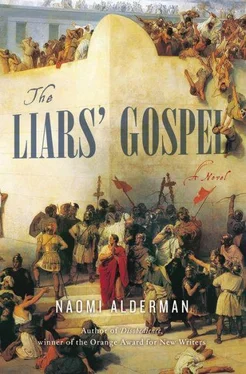As time goes on, more and more people will attempt to desert the city. Use them where you can — for information, or to take as slaves. Do not hesitate to kill them if they seem useless.
Batter the walls, of course, night and day. Attempt to lever out stones. Build up your platforms again. There will come a time to invade. You will be fighting against weakened, sickly, hungry men. You will prevail, for Rome always prevails. This is the whole of the law.
There is nothing new under the sun, says Solomon, son of David, that selfsame David who stormed the walls of Jerusalem and took her from the Jebusites, who perhaps themselves had taken her from someone else.
So it goes the same way. The battering of the walls had not ceased for six days and six nights. The inexorable platforms rose level with the city walls and the commander, Titus, had them test the ground under the struts with long blades ceaselessly. The people in the city knew the end was coming.
They were different then from the way they had been one hundred and thirty years earlier, when Pompey first let a stone tumble from the wall in the glittering air. The services in the Temple continued, but what did they have to sacrifice? They had eaten the sacred oil and the sacred grain. There were no lambs left to slaughter. The priests circled the sanctuary with pale skin and dark hungry eyes and a gnawing sense within them that God was angry and His wrath could not be quenched.
Titus knew that the wall would fall the day he stood in the morning on the highest platform and addressed the citizens of Jerusalem. The stench of the place rose to his nostrils even as his generals helped him up the wooden structure. There were rotting bodies in Jerusalem, unburied. It was silent, apart from the birds circling overhead. He spoke loudly. The dark-eyed people on the ramparts could hear him.
“People of Jerusalem,” he said, “you Jews have been in constant rebellion since Pompey first conquered you. Not just rebellion — open war with Rome. And why did you think you had any hope at all?
“Did you think you’d win because of your numbers? A tiny proportion of the Roman armies has been strong enough to defeat you. Did you think you’d win because of the loyalty of your allies? We are in the empire of Rome and no nation would support you over us. Did you think you’d win because you’re so muscular and strong? Even the Germans are our slaves. Did you think you’d win because of your strong walls? There are no walls stronger than the ocean that encircles Britain and yet they kneel down and worship our swords.
“No. Do you know why you thought you’d win? It was because we were kind to you. We gave you too much. We crowned your own people as kings, we let you observe your religious laws, we even let you take collections for your Temple. We treated you well, and you have taken our kindness as a sign of weakness.
“Jews, surrender now. We will kill only the men and take the women and children as slaves. Surrender now or understand what it means for Rome to be unkind.”
Titus is even now regretting the generosity of Pompey when he stood in his sandals in the Holy of Holies and said, “Let them keep their ritual, why not? They have fought bravely.” Pompey should have crushed them, and then Titus would not have had to undertake this long and boring siege.
The people of Jerusalem sent back a message that if he would only let them leave, they would depart, every man, woman and child, into the desert and leave the empty city to Titus. Titus angrily replied that they should understand their position: they had been conquered, they could not bargain. He prepared his troops for the final assault.
The Jews say that at this precise moment a tiny beetle flew into Titus’s ear and laid an egg which grew into a grub. And they say that over time that grub bored into his brain and lived there as a full-grown beetle, eating more and more of the matter of his head every year so that the pain and the sensation of being battered from the inside were utterly intolerable to him and when he died and they opened his head they found that the beetle had grown to the size of a bird. But no commentators other than the Jews mention this, so one may doubt the accuracy of these reports.
And the first stone fell, brought down by the battering engines. The soldiers swarmed into the city and began to kill, for they had waited a long time and many of their fellows had been killed by Jewish missiles and Jewish fire across those many months. Titus was no Pompey, and this siege had been no swift and well-managed affair. In any case, the purpose was not to secure the city for the good of Rome but to punish. To send a message.
The soldiers pulled down the buildings stone from stone. They slew anyone they met. They set fires in the colonnades of the Temple and the other public buildings, so that the silver and gold covering the timbers melted into shining puddles on the floor of the great plaza.
And they came at last to the Holy of Holies in the very heart of the Temple, where, they had been promised, the richest prizes of gold would be. They stopped then, amazed. Not just by the precious metals but by the workmanship, the rich decoration on every surface, the finely turned candelabrum, the beautiful silver trumpets whose metal was as thin as a blade of grass. Jerusalem’s riches were here, indeed, her most precious things entirely inward.
The soldiers milled around the outer sanctuary, collecting the golden goblets and ewers. And one man, seeing the veil across the inner sanctuary ripped away and the space within revealed, jumped up on his friend’s back to get a better view. And yes, the strange little sanctuary was empty. And, laughing, he pulled a burning timber from the hand of his friend and positioned himself just so and pulled back his arm, straining at the shoulder, and threw it like a javelin into the holiest place in the world.
The old wood and the dry cloth caught fire almost at once. And in the whole of Jerusalem there was a wailing, keening cry as of a woman who has woken in the morning to find her child dead.
There were other brutalities. The Romans set fire to one of the remaining colonnades of the outer court even though six thousand women and children were sheltering there, having been told by a false prophet that God had promised him that this place alone would be spared. The corpses were piled up so high on the altar of the Temple that blood flowed in a constant river down the steps.
They set fire to all the large buildings of the city: the council chamber, the tax office, the citadel, the palaces, the dwelling places of men of high rank, even the building that had once been the Prefect’s home. By the eighth day of the August moon those who still lived woke to see the dawn bloodred, for the whole city was on fire.
The fires burned for days. And when they finally burned themselves out, the soldiers went through the city and if any stone was sitting on top of any other they pulled them down. Except for one wall, the Western Wall of the outer courtyard of the Temple, which had remained standing and which it pleased Titus to leave in place to show what a mighty feat he had accomplished by destroying this city.
Titus took his troops back to Rome and there he celebrated a great triumph, parading through the streets of the city the holy vessels he had won in battle from the Temple in razed Jerusalem. They constructed a triumphal arch of marble depicting the spoils of war, Titus’s Arch, which stands in Rome to this day, just west of the Colosseum. And they minted a special commemorative coin in honor of the victory: Judea Capta, it read, Judea is captured. They struck more and more of them, for twenty-five years. And all across the Empire, from Britain to Egypt, from Spain to Turkey, when men paid for a loaf of bread or a side of pork or a turn at the whore, they paid with a coin showing a Jew bound with his hands behind his back or a woman weeping under a Judean date palm.
Читать дальше












